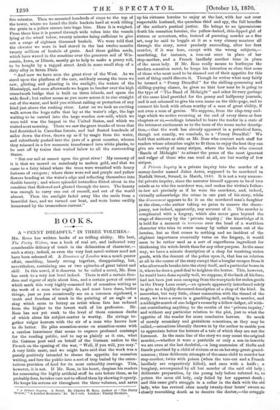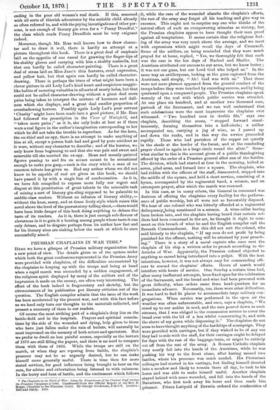BOOKS.
A "PENNY DREADFUL" IN THREE VOLUMES.* MR. Ross has written books of no trifling ability. His best, The Pretty Widow, was a book of real art, and indicated very considerable delicacy of touch in the delineation of character,— such a story, indeed, as even the very best novel-writers need not have been ashamed of. A Romance of London was a much poorer affair, rambling, loosely strung together, disappointing, but, nevertheless, containing one or two episodes of great talent and skill. In this novel, if it deserves to be called a novel, Mr. Ross has sunk to a very low level indeed. There is still a certain free- dom and vigour of style about him, and a certain power of colour which mark this very highly-seasoned bit of sensation writing as the work of a man who might do, and must have done, better things, just as you occasionally see on a common signboard a truth and freedom of touch in the painting of an eagle or a stag which seem to betray an artist whom fate has reduced from the higher to the lowest walk of his profession. Mr. Ross has not yet sunk to the level of those common daubs of which alone his subject-matter is worthy. He strings to- gether vulgar horrors with the air of a man who knows how to do better. He piles sensation-scene on sensation-scene with a careless luxuriance that seems to express profound contempt for the reading public, and to say as plainly as it can, what the German poet said on behalf of the German nation to the French on the opening of the war, "Well, if you will, you may." A very little more, and we might have said that the work was a parody positively intended to shame the appetite for sensation writing, and lure the public into a sort of trap baited by the osten- tatious provision of food for its most unhealthy cravings. This, however, it is not. If Mr. Ross, in his heart, despises his readers for consuming the highly artificial stuff he sets before them, as he probably does, he takes care not to offend them by showing it openly. He keeps his serious air throughout the three volumes, and saves
• A Private Inquiry. A NoveL By Charles H. Boss, Author of " The Pretty Widow," A London Romance," &c. In ft vols. London; Tinsley Brothers. •
up his virtuous heroine to enjoy at the last, with her not over respectable husband, the quondam thief and spy, the full benefits of the author's poetical justice. He brings to an ignominious death his sensation heroine, the yellow-haired, thin-lipped girl of sixteen or seventeen, who, instead of pursuing murder as a fine art, may be said to boggle at it as a very clumsy amateur all through the story, never precisely succeeding, after her first murder, if it was hers, except with the wrong subjects,— murdering, for instance, a tom-cat once in place of her step-mother, and a French landlady another time in place of the same lady. If Mr. Ross really means to burlesque the modern sensation novel, he keeps his intention so close that none of those who most need to be shamed out of their appetite for this sort of thing could discern it. Though he writes what may fairly be termed a "Penny Dreadful " for the shilling-possessing and shilling-paying classes, he gives no hint how near he is going to the type of "The Band of Midnight" and other literary garbage of the same kind provided for the penny and halfpenny journals, and is not ashamed to give his own name on the title-page, and to connect his book with others worthy of a man of great ability, if not even a man of genius. We suppose, from the clap-trap end- ings which we notice recurring at the end of every three or four chapters or so,—endings intended to leave the reader in a state of the intensest excitement as to the issue of the scene under descrip- tion,—that the work has already appeared in a periodical form, though not exactly, we conclude, in a Penny Dreadful.' We hold that authors as able as Mr. Ross who concoct such stuff for readers whose education ought to fit them to enjoy the best they can give are worthy of many stripes, where the hacks who concoct 'Bands of Midnight' to attract the pence of the most ignorant and vulgar of those who can read at all, are but worthy of few stripes.
A Private Inquiry is a private inquiry into the murder of a money-lender named Jabez Acres, supposed to be murdered in Norfolk Street, Strand, in March, 1840. It is not a very success- ful private inquiry, since the narrator himself appears to be of two minds as to who the murderer was, and makes the victim's father- in-law act precisely as if he were the murderer, and, indeed, virtually acknowledge the crime in one part of his story, while the denouement appears to fix it on the murdered man's daughter at the close,—the author taking no pains to remove the discre- pancy, nor indeed, apparently, any account of it. The murder is complicated with a forgery, which also never goes beyond the stage of discovery by the 'private inquiry ;' the knowledge of it is held for a moment in terrorem over the head of a worthless character who tries to screw money by unfair means out of the heroine, but as that comes to nothing and no incident of the slightest importance eventually turns on the forgery, it would seem to be rather used as a sort of superfluous ingredient for thickening the witch-broth than for any other purpose. lathe same way, we have a minute description of a shop for receiving stolen goods, with the descent of the police upon it, that has no relation at all to the course of the story except that a burglar escapes from it who afterwards breaks into the story itself, and a particular house in it, where he does a good deal to heighten the horror. This, however, he would have done equally well, we suppose, if the back of his form had not been just seen escaping from the receptacle for stolen goods in the Drury Lane court,—au episode apparently introduced solely to give us a highly-flavoured description of a shop of the kind. In somewhat, but very little, closer connection with the thread of the story, we have a scene in a gambling-hell, ending in murder, and a midnight search of one lodger's rooms by a fellow-lodger, all with- out contributing anything to the results of the private inquiry,' and without any particular relation to the plot, just to whet the appetite of the -reader for more conclusive horrors. So much of merely secondary and gratuitous sensations, as they may be called,—sensations liberally thrown in by the author to enable you to appreciate better the horrors of a tale of which they are not the foremost. In the main line of the story we may count the original murder,—whether it were a parricide or only a son-in-lawcide we are even at the last doubtful,—a long succession of thefts and frauds practised by a child of sixteen or so on her step-great-grand- mamma ; three deliberate attempts of the same child to murder her step-mother, twice with poison (when the tom-cat and a French landlady are respectively killed), and once with a knife ; a burglary, accompanied by all but murder of the said old lady ; deliberate preparation, by the young lady before referred to, to poison the same old lady, only foiled by her apparent death ; and this same girl's struggle in a cellar in the dark with the old lady, who has revived after nearly twenty-four hours' swoon so closely resembling death as to deceive the doctor,—the struggle
of mixing a sort of literary gin-sling supposed to be palatable to In this case, as in many others, the General in command was middle-class readers. Without an infusion of literary ability,— desirous of offering the chaplains every facility for the perform- without the keen, saucy, and at times lively style which raises this ance of public worship, but all were not so favourably disposed. novel above the level of the pooreststory-telling sheet,—there would We hear of one colonel who was bitterly offended at a regimental have been little danger of this book doing anything to debase the delinquency;being mentioned in a sermon. A wine-cellar having taste of its readers. As it is, there is just enough sub-flavour of been broken into, and the chaplain having heard that certain sol- cleverness in it to gain it a hearing among people whose taste it can diers had been concerned in the act, he thought it right to coin- only debase, and to disguise perhaps from its author how fast and ment on this breach of what he and the English compiler call the far his literary aims are sinking below the mark at which he once Seventh Commandment. But this did not suit the colonel, who































 Previous page
Previous page